- Home
- Stephen Hunt
Jack Cloudie j-5 Page 10
Jack Cloudie j-5 Read online
Page 10
A whistling from the chamber’s speaking trumpet called Oldcastle out of the engine pit and he barked a brief exchange of words with the voice at the other end before turning to Jack. ‘The Cassarabians don’t seem to know what the pipes on our spine are for, Mister Keats, not having seen their like before. We’re looking to give them a little flutter of the feathers on our back, but the mortar loading station has locked our boys out.’
Jack grabbed another blank punch card, leafing through the leather-bound instruction manual chained next to his punch-card writer. There were notes in pencil annotated alongside the armoury instruction sets, from a time when the transaction-engine chamber had possessed a full crew of navy enginemen who had hopefully known what they were doing better than the young novice currently manning their station. Jack winced when he noticed the date scribbled next to the notes. Their mortar tubes hadn’t been fired in over three years. It appeared as if the mothballed mortars had never been intended to be used again, hampered by a fully automated loading system with minimal manual oversight from the gunnery board down on the bridge. No wonder the airship was trying to shut out the crew from accessing her mortars; sailors had never been meant to manually load its shells. This is not going to be easy. Jack’s fingers danced nervously across the enamelled keys, each stroke of a symbolic logic icon punching a corresponding hole in the taut cardboard oblong.
‘Master cardsharp!’ shouted Coss. The steamman was pointing to the skylight. The dark shadow of the second Cassarabian airship was now illuminated by a spill of light from its fully open bomb bays. Was the Iron Partridge about to be rained on by explosives? No. Jack swore quietly to himself; cables were falling, human shadows riding the rappel lines down.
John Oldcastle ran to the wall and began to pull on a winch, the iron storm doors shutting across the skylight. ‘Prepare to repel borders!’ he yelled at the two stokers. ‘Mister Keats, today for the mortars would be mighty grand. Mister Shaftcrank, keep to your post. Read our systems off as they attempt to go live.’
Jack finished the punch card, pushing it into the injection mechanism, and the transaction engines began to rumble below, processing his new instructions. Oldcastle and the Benzari warriors were rifling through the air chests under their hammocks, the stokers pulling out sharp curved short-swords and the master cardsharp emerging with a bandoleer of crystal ammunition, three pistols and a short-barrelled carbine. He laid the weapons across the unmanned punch-card station next to Jack and began to break the guns, pushing a shell into each weapon’s breech, liquid explosives visibly sloshing about inside the shells’ transparent casing. ‘Turnaround is fair play, lad. We thought we were going fishing for a Cassarabian ship to find out what makes her tick, but instead it’s us that’s ended up wriggling on the end of their line.’
Jack hardly heard the old officer. His eyes darted to the abacus-like Rutledge Rotator above the punch-card writer, hundreds of beaded tiles turning and twisting to form line after line of results from his query. His last command had been accepted and processed but- ‘We’re still locked out!’
It couldn’t be. Jack’s instructions had been perfect, everything the manual said was needed to crack open the loading station for the ship’s waiting gunners; yet here they were, their mortars sealed deadly tight and still inaccessible to the sailors below.
There was a clanging from above the chamber’s skylight, iron doors being levered apart an inch or two. Enemy marines were clambering above their room!
‘A second attempt if you please, Mister Keats,’ ordered Oldcastle. ‘Cover the doors’ — that to the two stokers — ‘they’re not breaking in from above. That’s storm glass up there, good for gale, bullet or shell. But there are maintenance hatches aft of here that were never meant to be secured against our own boys repairing the hull. That’s where they’ll pile through. Ah, I’ll have a few blessed choice words with our shipwrights when we return back home.’
Jack fought down panic, trying to focus on the keys of his writer and block out the sound of Cassarabian marines scrabbling above them, swarming over the hull like ants. Coss had stopped distracting him by calling out the names of the systems that were interfering with the sailors’ tasks throughout the vessel. If Jack couldn’t allow their gunners access to the mortar loading station below, then an inconveniently sealed fire hatch here or there wasn’t going to make a whole lot of difference to the Iron Partridge’s survival.
‘Keep your eyes on your task,’ ordered Oldcastle. ‘Concentrate, now. I’ve got a warm welcome here for our wicked visitors.’
Jack was still trying to focus on his half-completed punch card when the first Cassarabian marines burst into the room with flashes of scimitar steel and pistol barrels. Their mouths were concealed by rubber breathing masks that made them look like beaked eagles, their black and silver uniforms covered by leather armour stained red with dyes — or the blood of the Iron Partridge’s unlucky sailors the invaders had already come across.
‘No man may mount a drak as a bonded rider,’ called out Farris Uddin, ‘unless they are able to kill as well as their drak.’
Omar blinked away the sweat rolling into his eyes. He held out his sword horizontally with his right hand as the shaven-headed guardsman officer walked down the line of struggling cadets. How much longer could he carry the weight of his blade like this, the steel heavier with every second? How much longer could he stand in the courtyard of the palace fortress’ middle bailey, exposed to the sun in full riding leathers?
‘And a drak,’ continued Farris Uddin, ‘is bred for nothing else but fighting and killing, which is-’ he stared down the line, ‘-more than I can say for you. It doesn’t take much to train as a cadet. I see the sons of generals and rich traders, I see the sons of guild heads and viziers, but I don’t see any here fit to mount a drak.’ The guardsman officer halted before Omar. ‘Is your sword heavy, Cadet Barir?’
No, you old goat. In my hands it is as light as a feather. And one day I’m going to use it to carve apart the people who burnt down Haffa and laid their fat, evil hands on Shadisa. ‘Yes, master.’
‘Yes, master,’ parroted the guardsman. ‘It will be a lot heavier when you have been pulling the reins for a day and are given the order to dive down on the enemy.’
‘I will dive like a falcon upon your order, master. A falcon with keen eyes and a willing heart.’
‘A falcon, well,’ sneered Uddin. ‘You believe, perhaps, that your training flights qualify you as a veteran? Let the weight of that scimitar sap away your irremediable optimism, boy. If your training draks could talk, the stables would be echoing with their laughter. A falcon must have talons, and most of you have, I fear, proved yourselves to be little more than songbirds kept too long in your perfumed cages. And back to your silk-lined cages you will go when you fail me.’
The guardsman stopped as a covered sedan chair emerged from a round tower in the curtain wall. ‘Ah,’ said Uddin. ‘It is that time. Our songbirds must line up along their perch. Command. Sheath your blades.’
Omar didn’t know what perch the guardsman was referring to, but he let his aching arm fall down like a rock, glad that the stocky man was not going to make them all move through the twenty-five basic patterns of scimitar thrusts and parries again. They had tasted months of this repetitive grind, and at times Omar felt as if he were training to be one of the dancing monkeys that capered for coins down in the bazaars. Life back on the water farm had not been nearly so regimented. Here, Omar was up early, to bed early, every minute spent being instructed how to act. How to hold, oil and sharpen a scimitar. How to check a crystal shell’s casing for cracks that could cause its liquid explosive charge to leak and shatter a rifle barrel in its owner’s face. How to saddle and care for a drak, or strip and clean a pistol; how to communicate silently in the air and on the ground using the hand and finger gestures of the language the caliph’s military called ‘war sign’. There was never enough time, it seemed, to adequately study all the skills a guardsman was expe
cted to master in the service of the empire. He didn’t care. Every day I get stronger, every day I get quicker with the blade, every day my aim with pistol and rifle grows truer. Each day that passes is a day nearer the time when I will have the skills to track down Shadisa and punish anyone who has dared to hurt her. He was aching for the chance to go down in the capital and begin searching the slave bazaars for her. Someone down there would remember her, surely. Remember the house that purchased such a beauty and the price she must have fetched.
Well, at least weapons drill made a change from flying practice on the draks. Even as Omar discovered he had something of an aptitude for the task, the actual act of mounting a drak and taking to the air frequently left him dizzy. Belonging to no single rider, the training draks were used to having novice cadets saddle them, and could beat a path into the air, sail around and land back at the fortress with minimal suggestions from a guardsman’s stirrups or reins. Sometimes Omar felt like he was just supplying guidance to the mighty flying creatures. But by the silver gates of heaven, their training draks knew how to leave saddle stiffness in a cadet’s limbs; the day after his first flight, Omar hadn’t even been able to bend down to fold the sheets of his cell’s bunk.
Working the water farm’s desalination lines had been easy graft in comparison, once you got the knack of moving in rhythm with the salt-fish; always plenty of time left over to rest and contemplate the slow-moving clouds above or the beauty of kitchen girls below. In Omar’s old existence, the rituals of his life had been small, insignificant things. Here in the palace fortress all of life seemed a ceremony, the corridors and rooms of the stronghold perching on the rocky peaks as much a monastic prison as a protecting fastness. Omar hadn’t even left the confines of the fortress to see the palace below, let alone gaze upon the legendary marvels of the capital’s streets on foot. He was free in name, but not in practice.
Green silk curtains along the side of the sedan chair were drawn back by four bearers who had carried it into the courtyard, to reveal an old white-haired man wearing a golden tunic, the dark silhouette of a drak on his chest. Boulous, Uddin’s retainer, slipped forward out of the shade of the fortress. Uddin frequently disappeared for long periods of time on guardsmen business, and during such absences the retainer was expected to maintain the demanding schedule of training. Unfortunately for Omar, the young man had a serious manner and a thoroughly studious attitude to how a cadet’s timetable should be maintained. Perhaps that came from his northern blood. Weren’t they all said to toil away in dark mills, worshipping money more than god, busying themselves with unnatural practices? Many of the other cadets had retainers too, the sons of the greatest families and houses in the empire. But in their case, the retainer’s duty was to run after the cadets, fetching and carrying and generally kowtowing. Boulous did disappointedly little of this for the heroic future guardsman that Omar was destined to become.
Boulous whispered to Omar, ‘That is the grand marshal of the order. We go onto our knees.’
A relative latecomer to the cadet’s ranks, Omar saw that all the other cadets along the courtyard were already dropping down on one knee, and Omar followed suit with undignified haste, not wishing to be singled out again for the attention of Uddin or the other tutors. Two of the guardsmen in the courtyard helped the grand marshal out of his sedan chair and up the steps towards the battlements. He was very old, Omar realized. The grand marshal wouldn’t have made it as far as the iron finger pillory at the bottom of the wall without assistance. Omar counted his blessings that he hadn’t caused any infractions of the order’s many rules that would have left him confined in the pillory today, his fingers inserted in the slots of the punishment frame and kneeling like a fool with the undignified sight of his arse presented to the order’s master of masters.
After the old man had gained the parapet, the cadets in the bailey were lined up; then the front of the line began to march up the stairs, and Omar saw that guardsmen and the order’s staff were marching out onto towers and gatehouse all across the fortress in a courtly fashion.
‘Are we to hear a speech?’ Omar whispered to Boulous.
‘No, no,’ said Boulous. ‘Today is a holy day, the Dream of the Silver Tree.’
Omar started. Is it that time of year already? Inside the guardsmen’s fortress, time seemed lost and scattered like motes of dust floating in the sunlight. Omar wistfully recalled the festival back in Haffa, happy cooks and Shadisa bringing out white cheese and fruit to the workers on the desalination lines. Even the grumpy old nomad, Alim, had taken that day off to play draughts with him in the shade of the tanks. Where are you now, Shadisa? Not enjoying a feast, of that I am sure. Well, Ben Issman, his name be blessed, might have dreamed of the hundred faces of the one true god under his tree thousands of years ago, but Omar hadn’t yet noticed any white cheese, fruit or iced water being distributed, let alone lazy hours playing draughts in celebration inside the corridors of the fortress.
The cadets filed out onto the battlements, a panoramic view of the Jahan Palace sparkling in the afternoon sunlight below them while the white roofs of the city stretched out for miles, encircled by the dazzle of sun towers. A distant rumble of fireworks drifted up towards the fortress, strings of explosives hung between the palm trees, detonating and shaking the streets; sheets of dust filling the spaces between the domes and towers.
‘Oh, this is bad,’ said Boulous.
It appeared to Omar that the retainer also possessed a naturally pessimistic bent — especially given that his status as a jahani, a slave raised from childhood to imperial service, meant he had about as much responsibility to concern him as the birds that made their nests in the cliffs below the fortress walls.
‘What is the trouble now?’ asked Omar.
‘This is the first year that the order has not been required to fly in formation over the city. Instead we can only stand and watch.’
‘Watch what?’
Boulous unsheathed the scimitar and passed it hilt-first to Omar as the command to present swords in a salute echoed down the battlements.
‘That …’
By the prophets!
Omar stared down the length of killing metal he had raised above the fortress parapet, catching sight of the first of hundreds of cigar-shaped silhouettes riding out of the sun, light reflecting off silver writing engraved across their hulls. They were like the narwhales that dipped in and out of the waters off Haffa, but a school of titans that had taken to the air, long glinting rams made of steel mounted on their nose domes. The drone of engine cars and the blur of propellers vibrated across the curtain wall. Great ribbons of silk had been tied to the crafts’ cruciform tails, rippling behind the armada of airships as though rainbow lines were being drawn across the perfectly clear sky above the capital.
‘Do you feel pride, Cadet Barir, at this great new show of force?’ said Farris Uddin from behind Omar. ‘Or do you feel shame that command of the imperial Aerial Squadron was given to the admirals of the caliph’s navy, rather than those who already had true mastery of the heavens under god?’
‘I believe I may feel both, master.’
‘You may indeed feel both,’ said Uddin. ‘For while nothing may stand against the empire and the new range of our ambitions, I fear that you see before you the ruin of the guardsmen’s fortunes. For centuries we trained to fight such machines when only our heathen neighbour possessed them, splashed grenade fire against their canvas and carried propeller snarls crafted for their engine cars. Now we have our own fleet and at best we are cursed to ride in their shadows as mere scouts. What do you see, Boulous?’
‘I see a man,’ said the retainer, looking towards the grand marshal’s place on the battlements with a tear in his eye, ‘made old before his time.’
‘You are a good and true servant of the Caliph Eternal,’ said Uddin, kindly. ‘But watch whose ears hear you say that.’ He raised his scimitar and shouted, ‘Remember Cann-Khali!’
All down the curtain wall the c
ry was taken up. The greatest battle of the order, where fifty draks and their riders had held off an army of ten thousand Seyadi levies for a week in a lonely mountain gorge.
Their greatest battle, thought Omar, mouthing the cry, their greatest triumph. But still an eventual defeat that had left every guardsman who fought in it a corpse.
It took every ounce of willpower for Jack to stop himself glancing behind his back. The shouts and grunts of the Cassarabian boarding party intermingled with the war cries of their two brave Benzari stokers and the thunder of pistols as John Oldcastle calmly discharged one after another across the transaction-engine pit. Concentrate on the punch card he was composing, not allow himself to be distracted by the screams of dying men, or Coss Shaftcrank shouting his tinny curses, or the thud of swords against flesh and the explosions of guns. Concentrate on the punch cards, where Jack was used to bending the calculation drums on transaction engines to his will. And where they wouldn’t bend, you could always roll with the drums and see where they took you.
Another yell, closer. The master cardsharp swore and tossed an empty pistol down onto the deck, but Jack couldn’t spare the seconds to look around. Not with the door on the mortar-loading station still locked tight against their gunnery deck crew.
A rifle ball ricocheted off the hull near Jack’s head, but he was focusing on writing the lines of code for the loading arms that had been decommissioned three years ago: the automated loading arms, with a dumb waiter system that still ran into the magazine buried in the well-protected heart of the Iron Partridge. The original repair crew who had refitted her had locked the automated systems down tight. But they hadn’t counted on Jack Keats and his clever fingers overwriting their work. Luckily for him, they had done their job in a rush, the ship’s ability to automatically fire and load constrained by some basic and strikingly obvious safeguards. Delete, delete, delete. He was almost there, the automation almost back online. He ignored the yell of the stoker being pushed down into the pit, impaled on the bayonets of three Cassarabian marines. Ignored the sounds, as Jack trusted the crewmen in the magazine would be ignoring the live shells being drawn into the dumb waiter system, lifted up and pushed into the breech of their mortars. Don’t you pay those shells any mind, boys. You just let them slide on past without anyone reaching for the manual overrides. The automated mortars that according to the notes in Jack’s manual couldn’t hit the side of a barn door, unless, please, the enemy’s barn door happened to be drifting feet above their mortar barrels. Sometimes, you just had to roll with the drums and see where they took you.

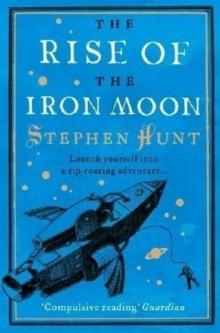 The Rise of the Iron Moon
The Rise of the Iron Moon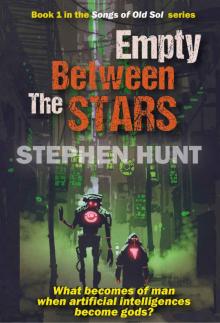 Empty Between the Stars (The Songs of Old Sol Book 1)
Empty Between the Stars (The Songs of Old Sol Book 1) From the Deep of the Dark
From the Deep of the Dark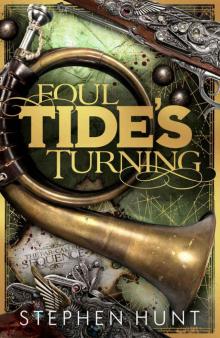 Foul Tide's Turning
Foul Tide's Turning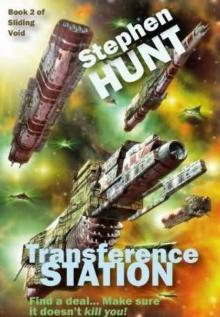 Transference Station
Transference Station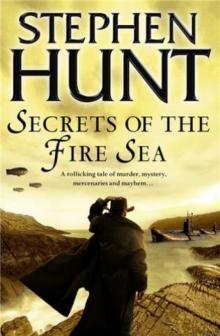 Secrets of the Fire Sea j-4
Secrets of the Fire Sea j-4 Void All The Way Down: The Sliding Void Omnibus
Void All The Way Down: The Sliding Void Omnibus The Kingdom Beyond the Waves j-2
The Kingdom Beyond the Waves j-2 From the Deep of the Dark j-6
From the Deep of the Dark j-6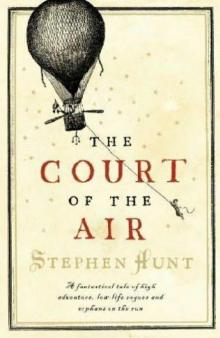 The Court of the Air
The Court of the Air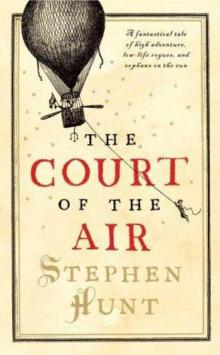 The Court of the Air j-1
The Court of the Air j-1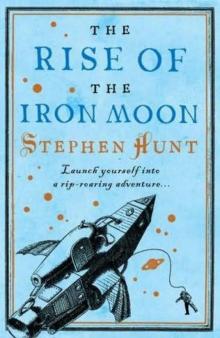 The rise of the Iron Moon j-3
The rise of the Iron Moon j-3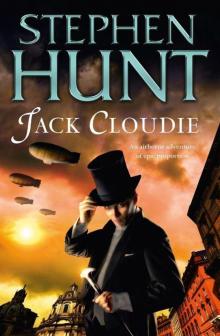 Jack Cloudie j-5
Jack Cloudie j-5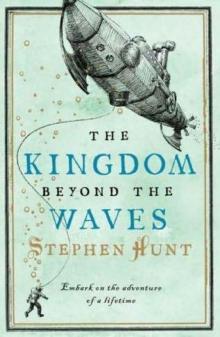 The Kingdom Beyond the Waves
The Kingdom Beyond the Waves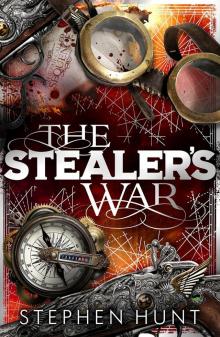 The Stealers' War
The Stealers' War In Dark Service
In Dark Service